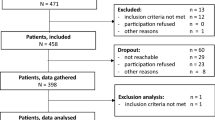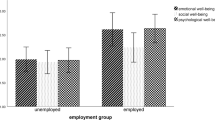Abstract
Schizophrenia is a severe and chronic disorder requiring long-lasting and comprehensive treatment. Because of this disorder patients are socially isolated. Consequently, schizophrenia has a significant economic burden both in a group of direct and indirect costs. The aim was to analyse experts’ opinions in the field of psychiatry concerning work possibilities among people with schizophrenia and to present the importance of employment for more effective treatment. A worldwide study was conducted between June 2011 and June 2013 using a questionnaire consisting of six open-closed questions and a short metrics. The questionnaire was delivered to experts and spread all over the world by post and via the internet. Over 3000 questionnaires were sent and the addressed specialists were requested to return them. From received 403 questionnaires 320 were included into the study, based on adopted inclusion and exclusion criteria. Although patients are afraid of looking for a job, respondents indicated that they crave for employment. The number of people that are able to work during remission of schizophrenia is considerably higher (50.35 %) than the number of actually employed (15.85 %). Non-pharmacological therapies were indicated as important to improve patients′ chances of finding a job during remission of schizophrenia. The number of people that can work during remission of schizophrenia is considerably higher than the number of affected people employed. Patients crave for a job and supported employment should be treated as priority by health-care decision makers.
Similar content being viewed by others
References
Garcia-Ruiz A, Costillas LP, Montesinos AC, Alcalde J, Oyagüez I, Casado M: Cost-effectiveness analysis of antipsychotics in reducing schizophrenia relapses. Health Econ Rev. 2012. doi:10.1186/2191-1991-2-8.
Phanthunane P, Vos T, Whiteford H, Bertram M, Udomratn P: Schizophrenia in Thailand: prevalence and burden of disease. Popul Health Metr. 2010. doi:10.1186/1478-7954-8-24.
Piccinelli M, Gomez Homen F: Gender differences in the epidemiology of affective disorders and schizophrenia, Division of Mental Health and Prevention of substance abuse. Ed World Health Organization. 1997. http://whqlibdoc.who.int/hq/1997/WHO_MSA_NAM_97.1.pdf. Accessed 8 Oct 2012.
Knapp M, Mangalore R, Simon J: The Global Costs of Schizophrenia. Schizophr Bull. 30:279–293, 2004.
Nowakowska E: Pharmacoeconomic research methodology. In: Nowakowska E, editor. Pharmacoeconomics-cooperation work. Poznań: Dział Wydawnictw Uczelnianych UMiKM; 2009. pp. 20–40.
Chang SM, Cho SJ, Hong JJ, Hahm BJ, Lee HJ, Park JI, Cho MJ: Economic Burden of Schizophrenia in South Korea. J Korean Med Sci. 23:167–175, 2008.
Barbato A: Schizophrenia and public health. Geneva: World Health Organization: 1998. http://www.who.int/mental_health/media/en/55.pdf. Accessed 29 Aug 2014.
Gustavsson A, Svensson M, Jacobi F, et al: Cost of disorders of the brain in Europe. Eur Neuropsychopharmacol. 21:718–779, 2010.
Mueser K, Salyers M, Mueser P: A prospective Analysis of Work in Schizophrenia. Schizophr Bull. 27(2):281–296, 2001.
Rogers ES, Walsh D, Masotta L, Danley K: Massachusetts Survey of Client Preferences for Community Support Services (Final Report). Boston: Center for Psychiatric Rehabilitation; 1991.
Twamley EW, Narvaez JM, Becker DR, Bartels SJ, Jeste DV: Supported employment for Middle-Aged and Older People with Schizophrenia. Am J Psychiatr Rehabil. 11(1):76–89, 2008.
McGurk SR, Mueser K, DeRosa J, Wolfe R: Work, Recovery, and Comorbidity in Schizophrenia: A Randomized Controlled Trial of Cognitive Remediation. Schizophr Bull. 35(2):319–335, 2009.
Clark RE, Bradley DJ, Xie H, Becker DR, Drake RE: The Economic Benefits of supported employment for Persons with Mental Illness. J Ment Health Policy Econ. 1:63–71, 1998.
Marwaha S, Johnson S, Bebbington P, Stafford M, Angermeyer MC, Brugha T, Azorin J, Kilian R, Hansen K, Toumi M: Rates and correlates of employment in people with schizophrenia in the UK, France and Germany. Brit J Psychiat. 191:30–37, 2007.
Twamley EW, Vella L, Burton CZ, Deborah RB, Bell MD, Jeste DV: The efficacy of supported employment for middle-aged and older people with schizophrenia. Schizophr Res. 135:100–104, 2012.
Priebe S, Warner R, Hubschmid T, Eckle I: Employment, Attitudes Toward Work, and Quality of Life Among People With Schizophrenia in Three Countries. Schizophr Bull. 24(3):469–477, 1998.
Srivastava AK, Stitt L, Thakar M, Shah N, Chinnasamy G: The abilities of improved schizophrenia patients to work and live independently in the community: a 10-year long-term outcome study from Mumbai, India. Ann Gen Psychiat. 2009. doi:10.1186/1744-859X-8-24.
Rummel-Kluge C, Pitschel-Walz G, Bäuml J, Kissling W: Psychoeducation in Schizophrenia – Results of a survey of all psychiatric institutions in Germany, Austria, and Switzerland. Schizophr Bull. 32:765–775, 2006.
Marwaha S, Johnson S: Schizophrenia and employment— a review. Soc Psychiatry Psychiatr Epidemiol. 39:337–349, 2004.
Żołnierczuk-Kieliszek D, Żak B: Social consequences of schizophrenia. Zdr Publ. 112 (3):362–366, 2002.
Mueser KT, McGurk SR: Schizophrenia. Lancet 363:2063–2072, 2004.
Magliano L, Fadden G, Madianos M, de Almieda JM, Held T, Guarneri M, Marasco C, Tosini P, Maj M: Burden on the families of patients with schizophrenia: Results of the BIOMED I study. Soc Psychiatry Psychiatr Epidemiol. 33(9):405–412, 1998.
Campbell K, Bond G, Drake R: Who benefits from supported employment: a meta-analytic study. Schizophr Bull. 37(2):370–380, 2011.
Burns T, Catty J, White S, Becker T, Koletsi M, Fioritti A, et al: The impact of supported employment and working on clinical and social functioning: results of an international study of individual placement and support. Schizophr Bull. 35(5):949–958, 2009.
Pfammatter M, Jungham UM, Brenner HD: Efficacy of psychological therapy in schizophrenia: conclusions from meta-analyses. Schizophr Bull. 32:64–80, 2006.
Acknowledgments
We thank several non-profit organizations, but especially Makshivim, EUFAMI (European Federation of Associations of Families of People with Mental Illness) and Pomost, who kindly helped us in collecting the questionnaires.
Author information
Authors and Affiliations
Corresponding author
Rights and permissions
About this article
Cite this article
Zaprutko, T., Kus, K., Bilobryvka, R. et al. Schizophrenia and Employment: Evaluation From Professionals Point of View. Psychiatr Q 86, 569–579 (2015). https://doi.org/10.1007/s11126-015-9354-6
Published:
Issue Date:
DOI: https://doi.org/10.1007/s11126-015-9354-6




